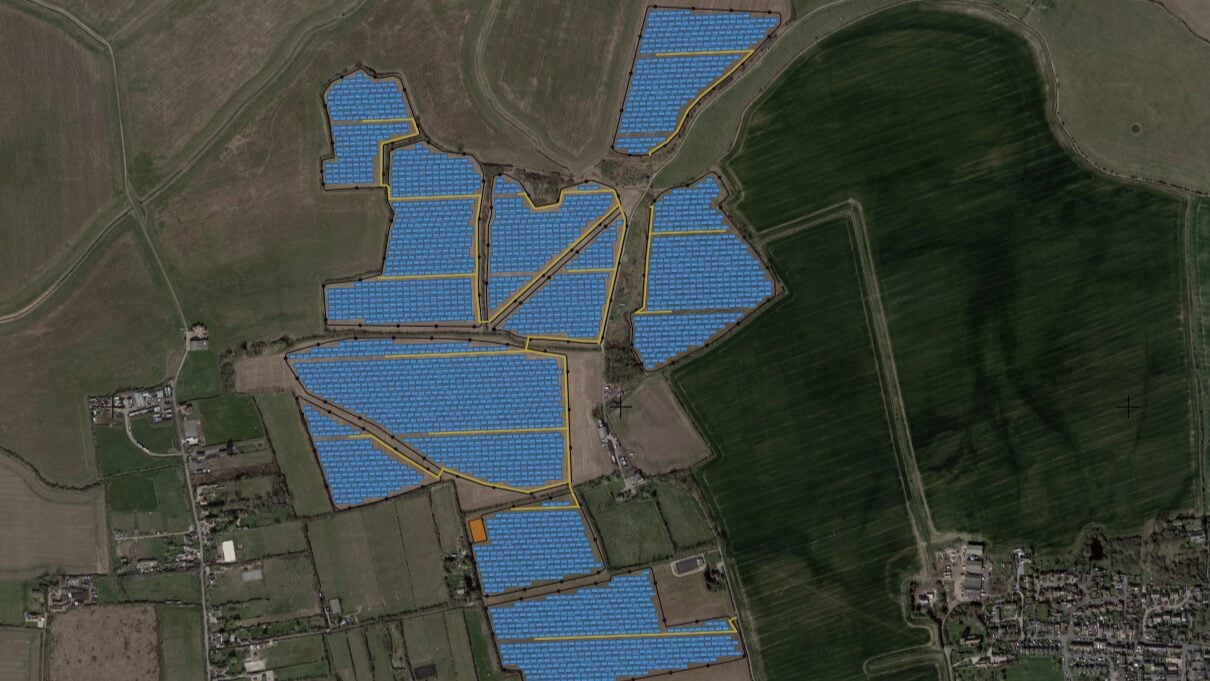Ireland’s first 4-hour duration battery storage project and the benefits of co-location
 Statkraft sees significant potential in co-location/hybrid assets under the same grid connection and is urging for policy changes in this area to maximise system benefits. Image: Statkraft.
Statkraft sees significant potential in co-location/hybrid assets under the same grid connection and is urging for policy changes in this area to maximise system benefits. Image: Statkraft.
In a feature article that originally appeared in Vol.39 of PV Tech Power, Statkraft’s Rory Griffin wrote about the challenges and opportunities enered in developing Ireland’s first 4-hour grid-scale battery energy storage system (BESS).
Statkraft is currently building the BESS project in y Offaly, in Ireland’s midlands. Supplied by Fluence, a global market leader in utility-scale energy storage solutions and services, the 20MW BESS will be co-located with the company’s 55.8MW Cushaling Wind Farm, which is also currently under construction.
As in other ries, grid capacity in Ireland is becoming scarce. As developers install a greater capacity of onshore wind and solar electricity generation, there is a good opportunity to sensibly locate storage to mitigate the risk of local constraints and support congestion management.
The Cushaling battery project will enable energy from renewable sources in the midlands area to be stored during times of low demand, reducing costly curtailment, and later dispatched at times of peak electricity demand.
It will also support Ireland’s TSO EirGrid in ensuring network stability by delivering fast-acting system services as more non-synchronous renewable generation comes online. Additionally, by securing a ten-year capacity market contract, the project will contribute towards energy security in Ireland.
Greater trading opportunity
Griffin explained that Statkraft sees significant potential in co-location/hybrid assets under the same grid connection and is urging for policy changes in this area to maximise system benefit. The sharing of Maximum Export Capacity (MEC) grid connection capacity is not currently permitted in Ireland.
While system constraints can last longer than four hours, the 4-hour Fluence system was a technology Statkraft had the confidence to deliver, and one that the company feels could mitigate the constraint risk. As wholesale prices have also been volatile, the use of a 4-hour duration creates greater energy trading opportunities.
Energy arbitrage
New routes to market will incentivise longer-duration storage, as will changes to the market systems to fully allow traders to optimise asset capability. According to Griffin, there should be more favourable treatment of network charges with respect to energy storage, based on its ability to offer flexibility to help manage network congestion.
As it stands, current network charges (namely Demand TUoS) represent a significant barrier and constrain the energy arbitrage opportunities for energy storage, thus limiting the benefits energy storage can offer to the system.
For market access for BESS in Ireland, there are currently three revenue streams: the DS3 system services market, the capacity market and ISEM energy trading opportunities. With each of these markets having its own challenges, it can come down to how an individual developer forecasts them and their risk appetite.
Put in place in 2017, the DS3 Programme did provide a clear route to market that encouraged investment in short-duration energy storage and six years later, there is now circa 800MW of 0.5-hour, 1-hour and 2-hour BESS projects operational on the system.
Tariff reduction risk
However, the DS3 market is now overheated, as evidenced by the TSO signalling downward pressure on DS3 reserve tariff rates, and scarcity scalars in the latest DS3 rate consultation that came out in late March 2024. Ireland’s energy regulator (CRU) previously cut the tariffs to avoid breaching the expenditure cap. The CRU allowed the expenditure cap to be breached last year, but the industry is again facing tariff reduction risk.
It is not clear what the tariff rates will be between now and April 2026 when the existing DS3 market is overdue to be replaced by the Future Arrangements System Services (FASS) market.
Rory Griffin is head of grid services at Statkraft Ireland. He has held operational roles with Ireland’s TSO in conventional power generation and, more recently, in developing grid services assets. In the TSO, he worked in Power System Protection for five years, followed by five years in the National Control Centre. Since 2022, he has managed Statkraft Ireland’s Grid Services team which develops storage and grid stability projects.
This content was collected from the Internet. If you want to it, please contact grace solar management.


